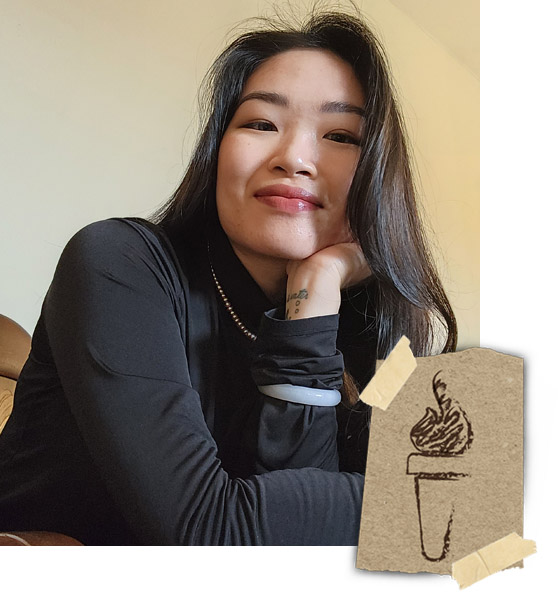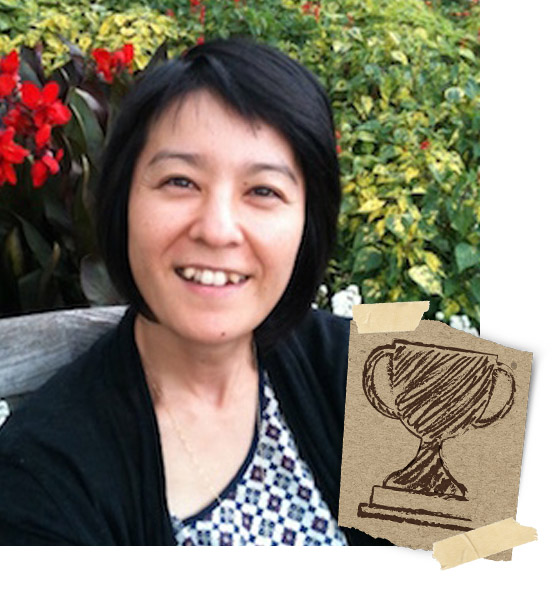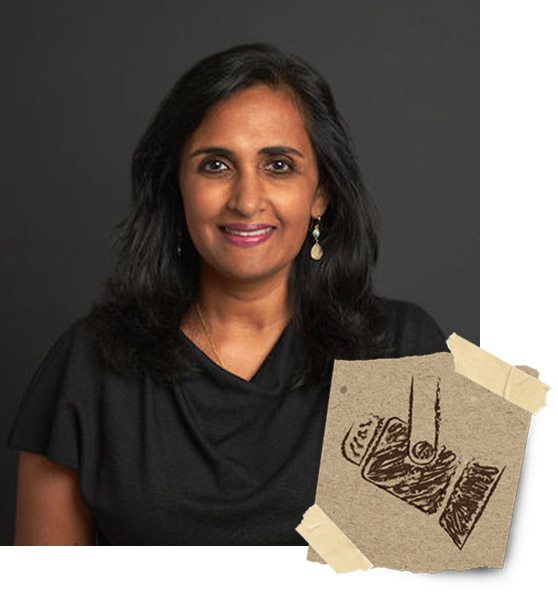Access Torch: Sylvia Lin
May 16, 2025 - Emily Jodway
 Throughout the month of May, the College of Social Science celebrates Asian Pacific Desi Islander (APIDA) Heritage Month and the many contributions of Asian Americans, Native Hawaiians and Pacific Islanders to our country’s diverse culture. Our Access Torch this month is Sylvia Lin, PhD student in the Department of Human Development and Family Studies whose research centers on ethnic-racial identity development among Asian-American youth.
Throughout the month of May, the College of Social Science celebrates Asian Pacific Desi Islander (APIDA) Heritage Month and the many contributions of Asian Americans, Native Hawaiians and Pacific Islanders to our country’s diverse culture. Our Access Torch this month is Sylvia Lin, PhD student in the Department of Human Development and Family Studies whose research centers on ethnic-racial identity development among Asian-American youth.
Lin says she first encountered microaggressions, racial discrimination and model minority assumptions early on in her childhood growing up in a predominantly white neighborhood, contributing to anxiety and depression that was only exacerbated by a struggle to find communities and resources for people like herself going through similar experiences. This left a mark on her that she carried into undergrad and chose to study psychology. She was passionate about identifying why there are so few resources and opportunities for Asian Americans struggling with their mental health, and to then build those resources and give back to the community that means so much to her.
She was also drawn to earn a degree in higher education from growing up and watching her parents struggle financially. She thought that if she worked hard, was successful in college and found a good job, she could support both herself and her parents.
“I think that’s a story for a lot of other immigrants as well, and for Asian Americans, where it appears as if we’re more academically gifted than others, and that follows that model minority myth,” she said. “It appears as if we’re naturally academically gifted, but really, a lot of the time it’s because we have to be.”
While she was in college, Lin met other Asian American students who grew up with similar experiences to her own. Even those who grew up in a community with a larger Asian American population struggled to find and access mental health resources, and were often held back from seeking help due to the existing stigma- teachers, parents, and counselors saw these students thriving academically and could not see why or how they could be struggling.
“That then led me to question … Even though we’re this big homogenized group, really we are all different, and we all have unique experiences depending on where we grew up and who we interacted with,” Lin said. “Which spurred my interest more into trying to figure out how to provide and give back to my community and people who struggled like I did.”
After reading an academic paper written by Dr. Yijie Wang and her work with Asian American populations during her undergrad, Lin reached out to learn more about Michigan State. Wang is part of the Human Development and Family Studies department, and Lin found that much of the work being done there aligned with her interests surrounding psychology and community-centered research.
“Psychology is really about understanding the psyche, the mental health of the person,” she explained. “But HDFS also emphasizes this connectedness, this contextualization, seeing a whole and bigger picture, and how to connect the resources, programming, policies, practices, things like that.”
Lin’s work as a graduate student at MSU centers around Asian American youth and ethnic identity development, the process of understanding ourselves in relation to the world around us, and how we relate to others as a consequence of this. Lin is focusing specifically on the part of individuals that is ethnically different, such as their cultural heritage, practices and beliefs and how someone may understand themselves in comparison to others via this lens.
One thing that Lin has discovered from her research is the impact that symbols have on the validation of one’s identity. “When you have symbols and other people who celebrate the same things you do, eat the same foods that you do, something so simple as going to a grocery store with food that you eat is validating to your ethnic identity and makes you feel stronger and more comfortable and confident with yourself,” she explained. One such example is the existence of an Asian grocery market in the neighborhood, with traditional foods and ingredients available that aren’t usually found in American grocery stores.
“A lot of Asians feel a sense of home and a sense of validation when they see things like that,” Lin added. “That adds on to their life and their ability to practice and engage in their culture and to maintain it.”
It can be isolating to come from a different culture and live in a community that lacks these symbols, and can take a toll on an individual’s mental health. Being out in the community and seeing signs of others like oneself living nearby, like decorations in windows during Lunar New Year, can help to alleviate this. But an unfortunate reality to this that may present itself is the potential for discrimination when individuals who are not members of the community see these symbols as infringements on their own culture. Lin gave examples of people going into Asian markets and openly gawking at the displays of live fish and ‘strange’ fruits and vegetables,
One way that Lin is working to support Asian American youths in particular is by bringing these spaces and places where others like them are thriving to their attention, as well as empowering them to share the spaces in their own neighborhoods to create a greater network of support. Her current study involved students walking around in their community and taking pictures of these symbolic places, then creating a photo-voice collage to share with each other.
“I’m hoping they see that we share some similar spaces,” she said. “That we identify some of the same places as safe spaces, places that make us feel validated and important. We may even talk about some similar negative experiences. And from there, uplift those voices and experiences to impact how we can better dismantle these myths and create programs and policies that are more effective at serving this community.
One of Lin’s specific goals surrounding this is to create spaces that are less academically-focused and focus more on the ethnic and cultural needs of every type of Asian individual, rather than feeding into the idea of a homogenized ‘Asian culture’. “Hopefully, from this study, I want to elevate the programs that exist but also tailor them to other needs, whether they be artistic or other hobbies and ways that I can get them informed about the spaces around them and to think more about their community,” she said.
During her time at Michigan State, Lin has found a great support system within the HDFS department. She mentions Drs. Linda Halgunseth and Francisco Villiareal, and their experiences with programming and intervention efforts for similar marginalized groups, and how they shape their own unique identities. She also has worked frequently with Dr. Yijie Wang in the Diversity in Adolescence Lab. “We really care about each other,” she explained. “We care about our mental health and well-being. We constantly check in with each other, and we are also constantly uplifting each other. And when we see one of us succeed, it feels like we’re all succeeding.”
During APIDA Heritage Month, Lin thinks back on her family’s pride in their culture and their perseverance through tough times. Her parents teaching her about cultural practices, cooking traditional recipes and celebrating Chinese holidays helped her to understand why it’s so important to preserve these traditions and helped her build resilience in the face of microaggressions and feelings of isolation. She appreciates having APIDA Heritage Month to highlight the many ethnic and cultural differences of each Asian community but also to celebrate the identity they all unite under.
“It’s a time for us to reflect on what’s been done and where we can go next,” she said. “An important step is to continue pushing for Asian American history in school curriculum. We are part of this country’s foundation and history and aren’t talked about enough in history books. I think including and incorporating our history into curriculum, into American History, is something that really solidifies our place in the United States and our experiences as also being very American experiences.”
Honorees’ views are their own and do not necessarily reflect those of the College of Social Science.
Read more:

Access Champion
Faculty/Staff
Dr. Naoko Wake
Dr. Naoko Wake specializes in the histories of identity, activism, and disability in Asian and Asian American communities.

Access Spotlight
Alumni
Dr. Usha Tummala-Narra
Dr. Usha Tummala-Narra is a professor of Counseling, Developmental and Educational Psychology at Boston College. Her research focuses on immigration and trauma, and she serves as an associate editor of the Asian American Journal of Psychology.

Access Matters
We strive to cultivate an inclusive and welcoming college environment that celebrates a diversity of people, ideas, and perspectives.

